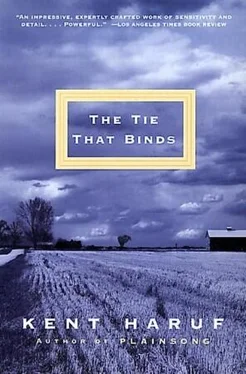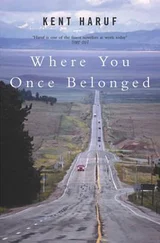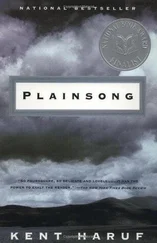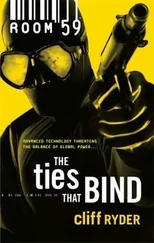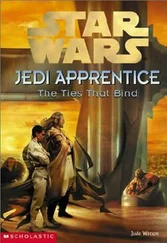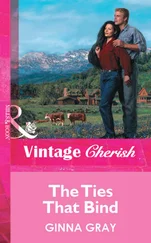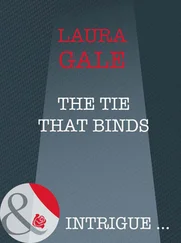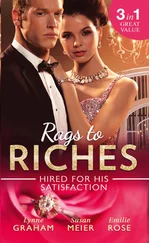But at the same time he was loving it and worrying about it, he must have hated it too, because at harvesttime Roy had to ask someone for help. He couldn’t do it alone. He could operate the header himself, but even with Edith driving the team of horses polling the header barge and Lyman leveling the wheat off in the back of the barge, he still needed one more person to stack the wheat once the barge was full and ready to be unloaded. So he had to ask John Roscoe, down the road a self mile, to do that.
John Roscoe was twenty-five in 1915. I’ve already said about him that he lasted. But he was able to last not so much by farming himself, like Roy did, as by adding more grassland to the original claim his mongrel father had filed ten years before he ever went to town that Saturday morning and disappeared. Calving time was the worst: you had to get up at three o’clock in the morning in a March blizzard to pull a calf that was trying to come breech; but usually one man could manage a small cattle operation. He also farmed some, though, in a small way. His mother cooked dinner and washed clothes, smoked her pipe and rocked herself to sleep in the afternoons beside the stove in the living room. Anyway, it was John Roscoe that was helping the Goodnoughs harvest their wheat that July in 1915.
I don’t suppose it was as hot then as it had been the previous year, when Ada died in the upstairs bedroom, but it was hot enough. The sky stayed clear, bright, high, and the heads of the wheat had filled and turned tan, ready to be cut. They had already cut most of it in the preceding five or six days, and Roy believed he could finish today, or at the latest, tomorrow.
So on this Thursday morning late in July, while Lyman milked and fed the six or seven Shorthorns they kept for milk cows — because they gave more milk than their Here-fords — Roy slid the sickle bar out the end of the header to sharpen the blades. Edith had to help him after she had cooked breakfast and washed dishes; she had to hold the end of the long sickle bar while he sat on the narrow iron seat, pumping the foot pedals of the grindstone like he was some overgrown kid racing to hell on a tricycle. He ground and honed both cutting edges of each blade, those triangular-shaped serrated blades called sections that were riveted along the length of the sickle bar. A few of the sections had been nicked by rocks, but he didn’t bother replacing them. That would take more time; he wanted to finish while the weather held. He ground the nicked serrated edges down smooth so that they shone like just-honed knife blades.
Lyman came over and watched as his father sat pumping on the grindstone.
“You turn the cows out?”
“Yes.”
“Did you put a cloth over the milk cans?”
“Yes.”
“There was a gob of flies dunking in it yesterday.”
“I know. I couldn’t find the cover cloth.”
“We wouldn’t need no cloth if you hadn’t lost the goddamn lids. But you never looked for the cloth either, did you? It was hanging on a nail in the kitchen.”
Lyman looked quick above his father’s bowed head at Edith. Lyman made a face.
“But go on now,” Roy said. “Get the horses in and harnessed. We’re late already.”
Lyman looked once more at Edith and ambled off in his hard high-topped shoes and loose overalls towards the horse pasture. Then Roy was finished with the sickle bar. Edith went in to prepare something for lunch for the four of them; they would eat at noon in the shade of the wheat stack. It saved having to go to the house.
When Roy had the sickle bar slid into the front of the header and bolted in place so that the sharp section blades, set between iron spikes called guards, would move back and forth, slicing the wheat off close to the ground, Lyman walked six horses up to the back of the header, where Roy harnessed them, three at each side, alongside a heavy iron pole. Then Edith hitched two more horses to the wagon, to the header barge, and they drove rattling out of the yard towards the wheat field. When they entered the field they could see John Roscoe standing on the stack far over there in the corner, waiting for the first load. They stopped the horses so that the header would be ready to begin cutting where they had left off the night before at the near end of the field.
“I suppose Roscoe’s been waiting there for a hour,” Roy said, “without a goddamn thing in the world to do except wait on us.”
“He doesn’t have his shirt off yet,” Edith said.
“It ain’t hot enough. He wants to get burned. He thinks fried skin looks pretty.”
“I don’t think he’ll burn,” Edith said. “He’s too brown.”
“That’s the Indian in him.”
“Daddy,” Edith said.
“What?” he said. “You know it well as anybody.” “Just the same, I don’t care—”
“You damn God better learn to,” Roy said. “Get the barge in place.”
Roy engaged the gears and chains on the bull wheel, and then he climbed up into the seat at the back of the header, between his two teams of horses.
“Giddup,” he said. “Go on now.”
The six horses moved, lunged forward, pushing the heavy rattling header. The engaged gears and chains turned the reel at the front that came around and laid the wheat down onto the sickle bar, to be cut off by the slicing knife-sharp sections. As the wheat was cut it fell onto a platform beneath the rotating reel, and then it was carried by a canvas belt off to the side and up another canvas belt through a chute and out, falling into the header barge that Edith drove alongside. Lyman was in the back of the barge where the cut wheat on its dusty stalks fell around him and on him, made him itch and sweat and scratch, while he forked the stuff around in the barge to level it off. Edith could hear him cussing miserably, insanely, behind her, but not so loud that Roy would hear.
“By Jesus,” he was saying. “Oh, you dirty son of a bitch. Get over there. Hog shit in a bucket.”
They finished that first swath through the length of the field, then Roy disengaged the gears on the bull wheel, pulled the lever to the tiller wheel, and the header made its neat square turn, with three of the horses walking slow, almost backing around, while the other three horses walked out fast at an angle, to point the header back up the field. The gears were engaged again, and the Goodnoughs started another swath.
When the header barge was full, so that Lyman stood up higher now on top of the cut wheat with his high-topped shoes full of bits of chaff, Roy stopped his six horses.
“Well,” he said, “go pitch it off. And don’t take all day jabbering.”
Lyman crawled up onto the front seat of the barge, and he and Edith drove over to the corner to John Roscoe, where the stack was. On the way Lyman took his shoes off and dumped the chaff out. When they stopped at the stack both of them got into the back to pitch the wheat off with their three-tined wheat forks.
“Shoes bothering you again?” John Roscoe said.
“Son of a bitch,” Lyman said. “Trade with me. I’ll stack this stuff.”
“Can’t. Your old man wants you right where he can see you, getting your nose full of it.” “Son of a bitch,” Lyman said.
“Why don’t you ask Edith? Edith, whyn’t you crawl back there and relieve your little brother? Be good for you to do some real work for a change.”
“You should have heard him,” Edith said. “My, my.”
“Needs his mouth washed out with soap.”
“Lye soap this time,” Edith said.
“Oh, dirty bastard,” Lyman said. “Oh, horse piss too.”
Then John Roscoe and Edith laughed and Lyman grinned like a cocker spaniel. They went on working that way throughout the morning, while the July sun rose higher and hotter in the sky and the dust behind the machinery hung in the air like clouds of gnats. Roy sat up there hard on the seat at the back of the header with the horses on either side of him. The horses lunged against the harness to get the header moving again, to push the heavy machine forward to cut another swath of wheat after it had been stopped at the end of a square turn or after stopping to wait for Edith and Lyman to come back with the emptied barge. Then with the header in motion, the six horses walked steadily up the field, pushing the weight and noise of the machine ahead of them. The horses were dark with sweat along their necks and shoulders, where the collars rode, and along their flanks. White foam, like soap lather, worked up between the big muscles on the insides of their back legs. Flies bothered their eyes and underbellies, so that as they walked, straining against the harness, they tossed their heads and switched their long harsh tails.
Читать дальше
